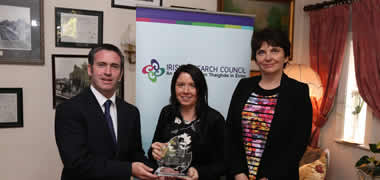
The Minister for Skills, Research and Innovation, Mr Damien English T.D., (left) and Professor Orla Feely, Chairperson of the Irish Research Council, (right) recently presented NUI Galway researcher Dr Aideen Ryan with an award in recognition of her selection and participation in the Lindau Nobel Laureate Meetings.
The Minister for Skills, Research and Innovation, Mr Damien English T.D., and Professor Orla Feely, Chairperson of the Irish Research Council, recently presented NUI Galway researcher Dr Aideen Ryan with an award in recognition of her selection and participation in the Lindau Nobel Laureate Meetings.
Since 1951, the Lindau Nobel Laureate Meetings have been bringing together the most esteemed scientists of their times with outstanding young scientists from all over the world. This year, 600 young researchers representing almost 80 countries took part in the Meeting. Dr Ryan was one of four young Irish researchers who were chosen in a competitive process to attend the 64th Lindau Nobel Laureate Meeting dedicated to Physiology and Medicine. The select group of scientists had the opportunity to present and discuss their research in master classes hosted by 37 Nobel Laureates.
Dr Ryan works within the Immunology group of the Regenerative Medicine Institute (REMEDI) at NUI Galway with Professor Laurence Egan, Dr Thomas Ritter and Professor Matthew Griffin and her research, which looks specifically at colon cancer, is supported by an Irish Cancer Society Research Fellowship. Colon cancer is one of the most common causes of cancer-related deaths in Ireland and represents a significant health problem. Dr Ryan’s research is taking a fresh approach by focusing on the cancer cells interaction with the immune system.
Dr Ryan, who is originally from Ballinasloe in Co. Galway, explains her work: “What fascinates me is the interaction of cancer cells with our immune cells. Understanding how our immune system allows the cancer to spread may allow us to develop ways to stop the process.”
The aim of her research is to find ways to help the body’s immune system detect and destroy cancer cells. “Our work in the lab has shown that we can target some of the signals coming from tumours and that this could help our immune cells to flourish.”
Dr Ryan’s recent research work, published in the journal Oncogene, has provided new insights into how the body’s immune system affects the spread of colon cancer cells and it is hoped that this work will inform the development of new drugs that could be used to strengthen our immune system’s response to cancer. This novel approach to cancer treatment could potentially result in better treatments and consequently a better prognosis and quality of life for patients with colon cancer.